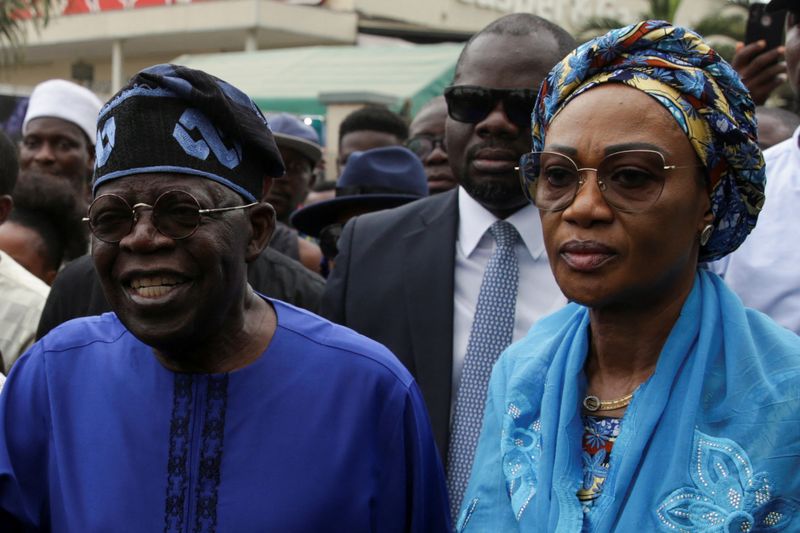Tinubu sworn in as Nigeria’s president, under pressure over economy
2023.05.29 08:23

© Reuters. FILE PHOTO: Presidential candidate Bola Ahmed Tinubu arrives with his wife Oluremi Tinubu at a polling station before casting his ballot in Ikeja, Lagos, Nigeria February 25, 2023. REUTERS/James Oatway
By Felix Onuah and MacDonald Dzirutwe
ABUJA (Reuters) – Bola Tinubu was sworn in as Nigeria’s president on Monday, facing mounting calls to improve economic and security conditions which many complain worsened under his predecessor Muhammadu Buhari.
Soon after the 71-year-old took his oath in an open-air ceremony in the capital’s Eagle’s Square, Buhari left for the airport on his way to his home village in Katsina state, where he says he will spend his retirement.
Tinubu, the former Lagos state governor and a member of Buhari’s party, has promised to be a better steward of Africa’s biggest economy and most populous nation.
“We have corruption, insecurity and many problems confronting us but don’t pity me. I asked for the job. I campaigned for it. No excuses,” he said in a speech on Sunday night.
Opponents see him as a member of the old guard who said last year it was his turn to lead after backing Buhari for the top job in 2015.
The February election had galvanised young voters hoping for a break from the two parties that have dominated Nigerian politics since military rule ended in 1999. But what authorities promised would be the country’s freest and fairest election yet ended in frustration for many.
Two of Tinubu’s main opponents are challenging his victory on the basis of fraud claims, which he dismisses. A tribunal will start on Tuesday to hear their main arguments, with a ruling not expected before September.
Tinubu inherits a struggling economy with record debt, shortages of foreign exchange and fuel, a weak naira currency, near two-decades-high inflation, skeletal power supplies and falling oil production due to crude theft and underinvestment.
A raft of protectionist economic policies and foreign currency interventions have also spooked investors.
Buhari defended his record on Sunday, saying new infrastructure such as roads, bridges and airports, and the protectionist policies have laid the foundations for future growth.
He has also touted successes in a 13-year fight against Islamist insurgents in the northeast, where his government ramped up military spending.
But insecurity has spread. Killings and kidnappings for ransom are rampant in the northwest. Separatist and gang violence plague the southeast, and clashes between farmers and herders persist in hinterland states known as Nigeria’s Middle Belt.








